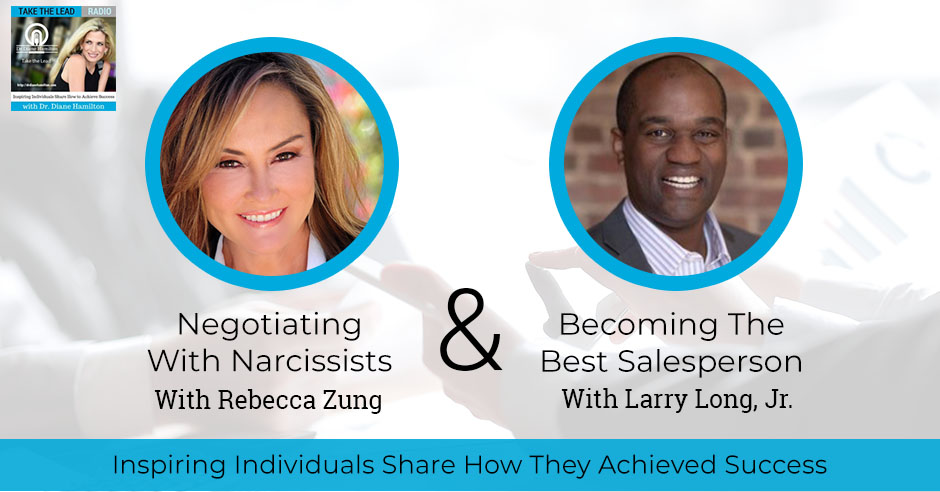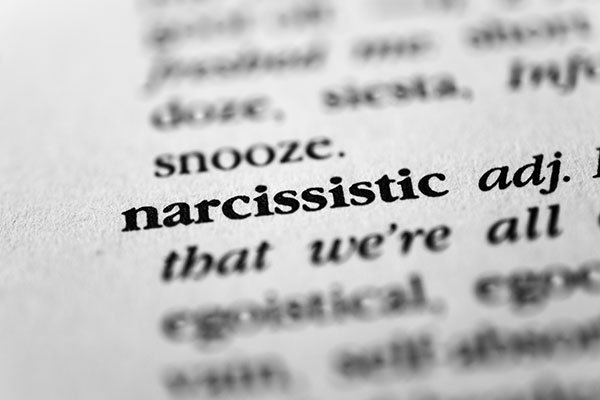Many people think of narcissists as big grandiose figures that go around bragging all the time. Rebecca Zung, however, says it’s not necessarily so. Rebecca is one of the top 1% of attorneys in the nation. Joining Dr. Diane Hamilton, she identifies other forms of narcissism such as covert and passive-aggressive narcissism. She also shares how she came to realize and started applying what she’s been learning about narcissism and to get narcissists off their positions to make headway in negotiations.
—
For many people, sales bear a negative connotation, and Larry Long, Jr. is out to prove that wrong. He defines sales simply as playing matchmaker of whatever product, service, thought, or idea we have with someone else’s needs, desires, challenges, dreams, and aspirations. And if you can meet that, you’re selling. Larry the Director of Collegiate Sales at Teamworks where he joins Dr. Diane Hamilton today to share some tips on how to be the best salesperson and get people to recognize the value of sales, and so much more. To know more about Larry’s approach to sales, you can check out his YouTube channel, Midweek Midday Motivational Minute.

I’m glad you joined us because we have Rebecca Zung and Larry Long Jr. Rebecca is the top 1% Attorney, Narcissism Negotiation Expert, and best-selling author. Larry is the Director of Collegiate Sales at Teamworks. He’s a speaker. He’s a sales and motivation expert. We’re going to learn about narcissism, how to be the best salesperson, and so much more.
—
Watch the episode here
Listen to the podcast here
Negotiating With Narcissists With Rebecca Zung
I am here with Rebecca Zung who is one of the top 1% of attorneys in the nation, having been recognized by US News & World Report as the best lawyer in America, as Legal Elite by Trend Magazine, and was recognized by her peers and the judiciary as AV Preeminent rated in Family Law. She has several best-selling books. I’m sure you’ve seen her on about every possible station you can imagine. It’s exciting to have you here, Rebecca. Welcome.
Thank you for having me.
I’m excited to talk to you. I get some attorneys on the show but not as many as I’d like. It’s interesting to get a different perspective in the business setting. You’ve got some great selling books, Negotiate Like YOU M.A.T.T.E.R.: The Sure Fire Method to Step Up and Win with the foreword by Robert Shapiro, and Breaking Free: A Step-by-Step Divorce Guide to Achieving Emotional, Physical & Spiritual Freedom. What you do is important for people to recognize in the business world because you talk about narcissists a lot and negotiating. I love that aspect because I’m a behavioral expert and probably have some family members in that category. How did you come to focus on narcissist?

In a couple of different ways, in some ways, like all of us, every single thing that I’ve ever done has set me up to be here where I am. I did practice Family Law for years but I don’t practice that much anymore because I don’t have the time for it with all the other things that I’m doing. I am still a partner at a firm. I only practice in high net worth Family Law, high stakes, billionaires, celebrities, in that arena. I encountered a narcissist or two. I fell in there. Maybe more than 1 or 2. That was that.
I started speaking on negotiating for years and that’s negotiating at the highest, most skilled level because you’re dealing with the things that mean the most to people, which is their money, businesses, children, and all that. I started speaking on negotiating for years and I was the keynote speaker for the American Bar Association. I wrote the book with Robert Shapiro and the whole thing. I realized that I was being targeted by two covert narcissists. I had never heard the term covert narcissist before. Somebody had brought it to my attention and I was like, “Narcissists, they’re big, grandiose figures that go around bragging all the time.” I came to find out that’s not necessarily how it is.
I started studying covert narcissist, passive-aggressive narcissism, and that’s when it clicked with me. I was like, “I can take what I know about negotiating, apply the knowledge that I’ve been learning all about narcissism, and see if this works to get narcissists off their position to make headway in these negotiations.” It started working. I started talking about it on my YouTube channel. My YouTube channel went from zero subscribers to 100,000 subscribers and 6 million views in ten months. I was like, “I’ve got something here.”
I have a program called SLAY Your Negotiation With a Narcissist. I have one that’s coming out specifically for people in the business. This is what I do. I coach people all over the world, both business and personal issues in negotiating with narcissists. The two narcissists that I had to deal with are both out of my life. Hopefully, they stay there. I wish them well but from afar. I deeply understand the psyche of that personality type. I know how to motivate them and to get any resolution.
[bctt tweet=”Narcissists are not exclusively the big, grandiose figures that go around bragging all the time; they can be covert and passive aggressive.” via=”no”]I’d like to describe what it is that a narcissist wants. What do you mean by covert? What are they hiding? What are they not showing that you would expect a narcissist to show?
Those are two different questions. Let me take the covert piece first. There are different types of narcissism. All of the psychologists have different answers as to how many different kinds or whatever. From what I’ve seen, there’s the covert kind which is more under the radar. They’re more dangerous in some ways because they look normal. They seem like nice people. Oftentimes they’re clergy, psychologists, doctors, lawyers, people in positions of influence and power over others. To the rest of the world, they seem super nice. They only save their passive-aggression. They’re under the radar. They often appear to be victims but equally as dangerous and horrible. They do all the same things that other narcissists do, they do it in a much more underhanded way. That’s a covert narcissist.
The grandiose narcissist is the kind that most people are used to. They’re the ones that go around and brag. They’re brash. Usually, they’re successful in business to a certain extent. There’s the malignant kind, which could be covert malignant. There are different combinations as we call it. The malignant type has an overlay of sociopathy. It has no trouble ruining somebody’s life, like accusing somebody of child molestation or things like that. They’re horrible, violent, stalking. Those are the three main types.
What drives a narcissist? That’s a simple question. It’s like rats in a maze, going after a piece of cheese. They all are dying for needing as much narcissistic supply as possible. Supply is anything that feeds their ego, adulation, respect, big houses, money, compliments, and all of those things. It’s also what I call the dark underbelly of narcissistic supply, which is control, intimidation, devaluing people, and debasing people. It’s all the same thing. It’s all driven to feed that one beast that will never be fed, which is their need for narcissistic supplies. What’s happening is they have a fragile inner self. They have no sense of inner values. They try to paste it on by having as much external value as they can. It never gets fed. It’s a black hole. That’s what drives them and that’s what you have to understand when you’re dealing with them in a negotiation.
I think of people I know. I don’t know if they’d fall into sociopathy or borderline personality disorder or whatever the different terms are to describe it. I have some people I can think of who I’ve run across in time. I don’t think that any amount of counseling or whatever is going to change who they are. It’s who they are. There have been TED Talks about how you want to be a little bit crazy or you want to be a little bit over the top and these are the ones that become CEOs. If you’re working in a work setting, what advice are you giving people who have to work for people like this?
Find a different job.
I take it that you wouldn’t want to work for Steve Jobs or somebody with that type of personality.
No, unless you understand that you’re there for a purpose. I’ve had to work for difficult people in the past, back when I used to be an employee, which has been a long time. You have to say, “This is how they are.” You have to understand that’s what you’re going to get. If you choose to stay in that situation, you’re choosing to do it for a different reason. Maybe it’s great because you get to work for Steve Jobs. You get to put that on your resume. You’re learning all kinds of skills. You have to understand that’s part of the territory and not take it personally or be upset every time they act like a narcissist because that’s what they are.
I know you’re dealing with a lot of people going through a divorce. You’ve probably taken a million depositions and you listen to all this stuff. What kinds of things were you surprised that people would say or do in that setting to get what they wanted?

Narcissists will do anything in any kind of litigation setting, whether it’s business litigation or divorce litigation. For a narcissist, you’re either for them or against them. If you’re against them, they’ll do anything they have to take you down. You become public enemy number one. They want to make sure that you look bad before they look bad. They want to make sure that everybody is lined up against you. They’d line up all their flying monkeys. They talk trash about you to everybody that’ll listen. They ignore court orders. They refuse to provide documentation. They’ll lie about things even in depositions, even things that are readily verifiable, which is crazy to me but they do that, or things they don’t even need to lie about, which is also crazy but that’s what they do. It’s all that stuff.
Which TV characters you go, “That’s a typical example,” like Billionaire when you watch that TV show. Are there some TV shows or people where you’re going, “This is what I’m talking about? That character stands out.”
On Billions, Damian Lewis is that character. Bobby Axelrod is his name. He’s one. The other guy played by Paul Giamatti is probably one too in a different way. I did a video on my YouTube channel which broke down how the character that Hugh Grant played in The Undoing on HBO was a narcissist and how they start to come unglued when the house of cards that they built starts to fall. They start making mistakes and they start getting desperate. They start going back to their well of things that worked in the beginning.
Spoiler alert for people who haven’t seen this but he was going back to the wife and trying to get her to hug him and say, “We’re a family.” He’s saying all the things that he knew were the things she wanted to hear to try to get her back on his side and not see what was right in front of her face, “You know I could never do that.” The gaslighting and all that sort of thing. It was a great study of what happens when you’re negotiating with a narcissist and what happens when they start becoming unglued.
You can help people negotiate with a narcissist and win. How do you win?
You have to understand that they’re driven by narcissistic supply. What you also have to understand is that, subconsciously, for a narcissist, there are levels of supply. There’s your grade A diamond level supply. There’s the grade C or D or what I call coal level supply. The diamond level supply is always going to be how they look to the world, community, and people they respect, whether it’s in the court system if it’s judges, mediators, lawyers. If it’s not in that system, maybe it’s their boss, their employees, co-workers, neighbors, or friends. It doesn’t matter. The thing that matters the most to them is the perception of the world.
My SLAY program stands for Strategy, Leverage, Anticipating what they’re going to do, and focusing on You, your case, and your position. You have to have a strong strategy. Part of that strategy is creating super-strong leverage, which is going to threaten a source of narcissistic supply that is going to mean more for them to protect and keep than the supply that they get from jerking you around and making your life miserable. Part of the reason they don’t settle is that there’s a joy watching you squirm.
[bctt tweet=”As sales professionals, we’ve got to both ask the right questions and listen.” via=”no”]How do you anticipate the irrational?
You know how they’re going to be. You know that they have a narcissistic injury. You know that fighting back against them is going to trigger narcissistic rage. At that point, that’s when they start making mistakes. In a lot of ways, you give them their noose to hang themselves. The more you are on the defensive, the more you allow them to have their foot on your abdomen. While your hands are up in the air and you’re lying on the ground, the more they’re going to do it. The not-so-secret secret, the whole scam of this whole thing is they’re the weaker ones. You’re the stronger one. They don’t want you to know that.
When you start fighting back, they start losing it, they start becoming unglued, they start making mistakes. They start trying to come back and go, “We don’t need to fight over this. We can settle this ourselves.” They start getting desperate and doing all different things. That’s when you know that you’re getting closed. They’re always the worst right before they’re ready to give up. They will eventually give in. What I call it is the strategy of building an invisible fence around them while they’re not looking, surrounding them where they don’t realize it until it’s too late and you’ve got some corner and then you go, “You can sign this agreement now. You can choose option A which is the easy option or you can choose option B which is not going to be good for you.” I call it ethically manipulating the manipulator.
You need leverage. What if you have no leverage?
There’s always a way to get leverage. That leverage is going to be threatening that diamond-level source of supply, maybe it’s depositions. I call it to depose to expose. Maybe it’s going through two years of text messages and emails and putting together summaries. When you find patterns, like, “They’ve lied 50 times over here,” put it all together in a summary with your backup documentation, the supporting documentation, the supporting emails right behind it. When you present all of that to them, they will believe that you’ve taken the time to pull it all out into the open, “Look, here you go. You lied 50 times in the last two years in emails to me. On August 1st, you said this. On August 10th, you said that. On July 31st, you said this.” They like to believe that they’re stating along and no one is noticing. If they forget about it, everybody else will too.
I see a lot of people like that, especially people who take drugs or do certain things. They assume that you’re believing their story. It’s interesting to me. Do they think you believe it? They don’t seem like stupid people. To me, some of them seem angry and people don’t confront them. They think they’re getting away with something that they’re not or do they know they’re not getting away with it and don’t care?
They hope that if they pretend like they’re getting away with it, everybody else will follow soon. A lot of time, it does. There’s a lot of times people are afraid to stand up to them, so they just don’t.
You deal with celebrity divorce discussions. You’ve been on every show in the world. I’m curious what you think of some of the divorces. I met Richard Burton and Elizabeth Taylor. They got married, divorced, and married. Do you get a lot of people that go back together who fit this narcissistic category? I’m curious if there are any divorce cases you find interesting?

That happens sometimes. There is something called trauma bonding. You’ve heard of victims become in love with their captors and things like that. They were people who believed that they need this person. There are some studies that have been done on that. Robert Sapolsky did one out of Stanford University. He had done this study on monkeys where they got a treat but it’s not every time they did the right thing, it’s variably. If they got a treat every single time they did something good, the dopamine levels in their brain remained the same. If they only got it intermittently and they didn’t know when they were going to get the treat, then the dopamine levels in their brain would rise to the level of cocaine. It’s addictive.
The way a narcissist works is they do this love bomb thing in the beginning. Even if it’s a business relationship, they start with appearing perfect, charming, charismatic. They’re perfect for you in every way. They then start with devaluing and discarding. You’re back and forth between these three areas of the relationship, love bomb, devalue, discard, and then back to love bomb and then discard. Your brain starts to become addicted to them in a lot of ways, which is why it makes it hard for people to leave a narcissist.
The TV show that’s out with Eric Bana playing the crazy guy, did you see that? It was good. It was on Netflix. It was Dirty John. Have you seen that episode?
Yes, I watched that. That is a perfect example of a narcissist and a malignant one at that.
You watch that and you think, “Does she not see that he’s creepy?” Do you think women see it but they love the attention or vice versa? Is it mostly men that you think are more narcissistic? What percentage is it?
There are a lot of women narcissists out there. I don’t know what the breakdown is. Maybe it’s 50/50, that’s for sure. Women are better at being covert narcissists because they know better than to stand around and brag. I do want to make a point about narcissism. If somebody says something nice about themselves, it doesn’t make them a narcissist. The true test of narcissism is that they have no inner sense of value and they have no ability to have feelings of care or empathy for others. It’s both things. Just because somebody’s confident in themselves, it doesn’t make them a narcissist.
That’s an important point. I had written my doctoral dissertation on emotional intelligence and empathy is such a huge part of that. People toss around the word narcissist a lot, especially people in Hollywood or people who were on shows, people that do what you and I do. How do you differentiate from somebody who’s maybe popular on news and different things and programs from a true narcissist who’s doing it for different reasons?
You have to know their personal life and their selves. You have to know how do they treat other people. How are they treating their employees? How are they treating their spouse? How are they treating their neighbors? People can come to conclusions, “This person is a narcissist.” They have no idea about anything in their personal life. Maybe they’re helping the homeless regularly or doing all kinds of things that they’re not asking for credit score or there’s no show about it. They’re doing it for people because they’re a kind person and they care about others. I do caution people on saying, “That person is a narcissist.” I did that video on me dealing with Hugh Grant. I analyzed his character. A lot of people were commenting on the video and saying, “Hugh Grant is a narcissist.” I thought, “You have no idea about that. You don’t even know anything about him and his personal life.”
That’s how convincing of an actor he is. He was good in that role, maybe everybody’s thinking that.
Who knows? He could be but he might not be either.
It’s funny when you watch these characters, sometimes you go, “He was awfully convincing in that role. I don’t know how you could pull that off if you don’t have certain qualities.” I remember thinking that of Bradley Cooper of how bad he acted in the Wedding Crashers. He was awful. It took me a while to like him on other things. You see people in these roles and they’re very convincing. You have to keep an open mind and realize that you don’t know people until you really know people. I thought this was fascinating, what you do. It’s helpful for everybody to learn more about behavior since I’m a curiosity, perception, and emotional intelligence speaker. I thought this was a nice tie-in to do something a little bit different. A lot of people will want to know how to get your books and follow you. How can they find you?
If they go to YouTube and they type in negotiating with a narcissist, you’ll find my channel. You can type in my name, Rebecca Zung, and you’ll find my channel. I’m on Instagram, @RebeccaZung. I do have a free Crush My Negotiation prep worksheet if anybody wants that. It’s an eBook. It has fifteen pages. They can get that at WinMyNegotiation.com. My website is RebeccaZung.com. I do have a free private Facebook group if people want to join that as well, which is Narcissist Negotiators with Rebecca Zung. There are all kinds of stuff for people.
That’s nice of you, Rebecca. This was fascinating. I hope everybody checks out your site. Thank you so much for being on the show.
Thank you so much for having me. This was great.
It was fun.
Becoming The Best Salesperson With Larry Long, Jr.
I am here with Larry Long Jr who’s the Director of Collegiate sales at Teamworks. He’s also the Founder and CEO of Larry Long Jr, LLC, which focuses on sales motivation, inspiration, training, and coaching. He’s the host of the Midweek Midday Motivational Minute. It’s nice to have you here, Larry.
Dr. Diane, it’s my pleasure to be here with you. It’s such an honor.
Thank you. It’s so much fun to talk about some of the stuff that you do. I love sales. I’m fascinated by SaaS sales. Some of the stuff that you work on is helpful. This doesn’t air on the airwaves. I also take parts of these out and share them with my students. I’ve taught more than 1,000 courses. It’s nice when they get to hear some real-world stuff. I do want to get a backstory on you for those people who don’t know you. Do you mind? How did you get to this point?
This has been quite the adventure and some might say misadventure. In a nutshell, I played baseball at the University of Maryland. I did some IT consulting at Accenture. I realized that wasn’t my path so I made the jump and opened up an indoor baseball and softball academy in Raleigh, North Carolina. We could not keep the lights on. I had to close that up after a year and a half. That’s when I started my software sales career as an individual contributor and then as a leader. That’s where I found my groove in sales leadership, sales coaching, and helping sales professionals take their game to that next level.
One of my first jobs was selling software as part of IBM in the ‘80s. Things have changed quite a bit. A lot of people are trying to get into SaaS sales to develop companies that have that capability. For those who don’t know what that entails, I know a lot of people are sophisticated and know different things about it but what could you tell people about what it’s like in that industry?
I love it. If you think about it, software is eating the world. Here in North Carolina, if you go to the gas station, c, and you want to order a sandwich, you’re not going to talk to a person. You better go to the screen and you’re going to use that software to place your order. I’ve been fortunate. I work with Teamworks, which makes the dream work. We sell software to elite athletic teams to help them better communicate, collaborate, operational efficiency as well as to build a brand on social whether that’s Instagram or, as the Millennials call it, Gram or IG, Twitter, TikTok. My son said, “Dad, you can’t go on TikTok. You can’t dance.” It’s fascinating and amazing, the world of software.
[bctt tweet=”True, genuine relationships are built on trust. ” via=”no”]Now it’s Clubhouse. I can’t even keep up with how many different social media platforms there are. That one, I keep hearing about a lot. That’s all audio and no video, which is nice for us who don’t want to get up and get ready first thing in the morning. There are a lot of different ways to connect with consumers. I often talk about this in my courses that aren’t sales-related. I teach technology students and I’m like, “Everything is better if you know sales. Everything is sales.” My husband is a physician and that’s sales. People don’t recognize how much it is pervasive in everything. How do you get people to recognize the value of sales in what they do? Do we teach everybody a little bit of sales techniques?
We should because sales touches everything that we do. My keynote is sales is not a four-letter word. Many words have a negative connotation. It’s funny because I use the analogy of a doctor doing the SOAP notes, Subjective-Objective Assessment and Plan. As sales professionals, we got to ask the right questions and we have to listen. My definition of sales is we’re playing matchmaker of whatever product, service, thought, or idea we have with someone else’s needs, wants, desires, challenges, hopes, dreams, and aspirations. If you can make that match, you’re selling.
A big part of that is having curiosity. I’m a curiosity expert. To be good at sales, you have to ask questions. I often tell a story of my mortification in many sales situations because I didn’t ask questions. It comes back to bite you if you sell at someone instead of asking, finding out their pain points, finding out what you can do for them. It’s interesting to see sales. There are more teams now than in the past. Are you seeing more of that?
I am. The collaborative selling, the team selling. We say, “Teamwork makes the dream work.” You said it correctly in terms of that curiosity and the questions. My word and theme for 2021 is listen. Many times, sales professionals and others listen to respond instead of listening to understand. If you don’t understand, how can you provide me with value? How can you help me accomplish my goals if you haven’t listened and dug into my motivation? Why do I want to get to this point? How can you best help me get there? To answer your question, yes, more teams, and, hopefully, more listening. Two people, that’s four ears. That’s a lot of listening going on, I hope.
When I was in pharmaceutical sales, they started out with me and they give you your territory, “Here are your ZIP codes. Have a good day.” They thought, “One person is good. Let’s add another person.” They’ll go every two weeks instead of me being there every four weeks. Eventually, it got to be eight of us. By that time, maybe 2, 4, or 8 was better. It got to be overwhelming, somewhat. The point was trying to figure out how to reach these doctors in the way they wanted to hear the message. At that point, they were thinking more is better. Sometimes, more can be too much. When I was in that field, I often found that I was talking at them because they put so much pressure on me in training, “You have to say this. You have to say that. You’ve only got five seconds to do this. They’re going to walk away from you, so you better get this in.” What do you think that they’re doing in training? Are they doing that same thing? Are they helping people develop relationships better?

I’ll be honest with you, it’s unfortunate. I’m on a webinar coming up talking about leadership, management, sales. There are many folks that are doing it the wrong way. They’re doing it that way because that’s the way we’ve always done it. That doesn’t mean that it’s right. The keyword there is relationships. The difference between contacts, people you know, and contracts, people you engage with and do business with, is the letter R and that’s relationship. True, genuine relationships are built on trust. People buy from folks that they know, like, trust, and that they believe have their best interest and can add value for what they’re trying to accomplish.
Going back to the curiosity thing, I had this boss who was great at looking around, seeing what the person’s interests were, finding out where they went to school, what teams they like, that type of thing, and developing that rapport based on what do we have in common? What can I ask you about you? I don’t think that enough of that is done. It’s hard to do that virtually, especially if you never see people and if you’re selling something online. How do you get that relationship?
You’ve got to put your thinking cap on. You’ve got to be creative. Especially now, there are more channels. I can go and look on your LinkedIn page and see that you’re an Arizona State Sun Devil. Looks like someone did his research. I can go and look on your page and see what your interests are. I can see what posts you’re liking. Are you creating content yourself? I can tailor that connection so that we can then connect eye to eye. If I can’t do that with you, I can find someone hopefully that does know you and I can ask them to give me the scouting report and ask them to put in a good word.
It is the relationships and so much of selling is selling at people which no one wants to be sold at. I want a partner. I want someone who’s going to work beside me and help me along my journey to get to where I want to get to and that starts with them understanding me. There’s a saying, “Show me that you know me.” Many folks are lazy. They don’t want to put in the work. They want to go through the motions. I call them pluggers. I don’t like working with pluggers. I like working with drivers that want to be go-getters but also go-givers.
One of the hardest parts of sales used to be the gatekeeper. In pharmaceutical sales, it was a little bit different. You had to get past the receptionist. In mortgage sales and different types of sales I’ve been in, you’ve got somebody who maybe says, “Don’t let anybody talk to this person or that person.” How do you get to know that person if they don’t have a social media platform and if you’re trying to get to know somebody to develop a relationship with them? A lot of people bypass those gatekeepers, which is a big mistake in my opinion.
[bctt tweet=”You’ve got to persevere through the chaos and turbulence and keep going with a smile on your face.” via=”no”]I agree. That gatekeeper is a person. That person has feelings and emotions. They probably don’t get shown a lot of love, appreciation. You’ve got to be genuine. You genuinely care about the person that’s at that front desk or the receptionist who routes the call. You work on getting to know them. They might not have social media and that’s okay. It starts with questions. “How are you? What’s going on in your world? How are you holding up amongst the pandemic?” There’s always something you can ask, hopefully, to get them engaged, get them in conversation. There’s a saying, “Loose lips sink ships.” That’s an ally who has the inside scoop. It’s great to have an insider if you’re able to develop and grow that relationship, but that takes a true professional right there. That’s not for the amateur. I’m about to release my Sales 101: The Basics and that right there is PhD level. It’s coming soon.
Tell me about that.
I’ve been working on this for months. It’s an online, on-demand sales training course, Sales 101: The Basics. It’s designed to provide the basic fundamentals to be successful as a sales professional. We go through time management, prospecting, discovery, demo, pipeline management, as well as closing. We do it in a way that has never been seen before. I’m a unique personality and I have a unique view on sales. We’re bringing that to the masses.
A lot of people can benefit from it. There are many sales techniques that people need even if they’re not in sales. Some of the things that we’re talking about, curiosity to ask, find and build that empathy, and another important thing is tenacity. I don’t know if you could build tenacity as well in any job more than sales or be able to take no many times and keep coming back. How do you get salespeople to not give up if they keep hearing no?
It’s a mindset. I’ll be honest with you, it’s not for everyone. I have a term called EPIC. The E is Entrepreneurial spirit. You’ve got to take that ownership. The P is Preparation and Planning, Allen Iverson said it best, we’re talking about practice. The I is that Internal drive and desire. Some people call it grit and some people call it tenacity. You’ve got to persevere through the chaos, through the turbulence, and you got to keep going with a smile on your face. The C, I’m going to quadruple click, is Communication, Curiosity. Kevin Hart said it best, Confidence. Say it with your chest. Also, you have to care. People are too smart, they can smell BS from a mile away.
EPIC is my acronym for the book that I wrote on perception as well. I love that we have this. The perception process involves Evaluation, Prediction, Interpretation, and Correlation. Sometimes, these acronyms can help you remember some of the critical things that we go through in this process. There’s something else you do I wanted to ask you about. You do this Midweek Midday Motivational Minute. What started that and why do you do that?
I’ll be honest with you. I was writing short-form content on LinkedIn. A mini mentor of mine, Morgan Ingram out of Atlanta, said, “Larry, you got to get on video.” I said, “Morgan, I got the face for radio. I’m not ready for a video.” He said, “Come on, man. Don’t be scared. You’re helping many people with your short form. Getting you on video is going to take you to that next level.” My mentor told me, “If you don’t do a video, you’re being selfish.” All it takes is one person that you’re able to impact for it to make a difference. That was on a Friday at a happy hour, virtually.
That following Wednesday, I said, “No one is going to call me selfish and walk away with it.” I went out on my back porch, I put my little iPhone on selfie video, and I recorded my first Midweek Midday Motivational Minute. The topic was Say YES To You! I recorded episode number 44. We’ve been able to create a community and impact folks with positivity because there’s so much negativity. You turn to your left, turn to your right, turn on the news, and it will have you in a bad mood for seven straight days. I want to bring a breath of fresh air and positivity to everyone who needs it, which we all need.
What are you recommending? People are struggling with the pandemic and all that. What things are you doing to help with that?
I’m writing a book based on my top seven. It is that perseverance. I call it taking care of your MBS, your mind, body, and your soul. You are what you eat and making sure you surround yourself with positive influences. Whether that’s people, podcasts, books, you’ve got to be feeding yourself good stuff if you want to be putting out good stuff. During this tough time, it’s taking care of self but also taking care of others. It’s amazing that when you give back to others and you help others out, the impact that it has on you, your soul, and your spirit, at least from my experience, is off the charts. These are basics. My son and my daughter, these are things that I’m working with them on. Even as adults, back to the basics is critical to have success, especially through all the stuff that we’re going through.
It’s a tough time. A lot of people are having a hard time staying motivated. I had a professor from Harvard and we were talking about people being more productive working virtually, which is interesting. A lot of people I talked to are down even though they’re working harder. I’m wondering when we’re going to get to that burnout stage. I prefer to work virtually. It’s my favorite way to work. For people who are having struggles with that, what are you telling them if virtual isn’t their first passion?
My advice to them is to hang in there. You’ve got to find a way to make it through these choppy waters. For me, journaling. I don’t even write well but I’m getting my thoughts out. I have The Happiness Project, my sister got it for me. It’s a one-sentence journal that I’m supposed to do every day. I missed a day or two, here and there but I’m getting my words out. Anytime you can go outside and walk around the neighborhood, enjoying nature, it makes a world of difference. I would say laughter. I don’t know what makes you laugh. I’m a big Kevin Hart fan. When you go on YouTube, the algorithm works. If you watched t a Kevin Hart video, it will say, “If you like that, let me take you to Chris Rock.” I like humor as well as inspiration. Tony Robbins, Jim Rohn, Les Brown, Eric Thomas, Larry Long Jr, the list goes on and on.
I love the list. They’re all great. As you brought that up, it made me think of connection. I’m not affiliated or anything with Clubhouse. I’m only bringing it up because it’s new. I didn’t even know about it. People are getting on these sites to connect because it’s a live conversation. We’re having videos where we’re talking to each other. You’re not connecting as easily. You might have people raising their hand and you have a little bit of chat and things. Maybe that one is popular because you have this audio connectivity with people around the world and you’re able to develop community. How can we connect? Who can we find as mentors? Where does mentorship play in sales?

It’s important in life, mentors and many mentors. I spoke to a nonprofit, Easterseals, and we were talking about the importance of having many mentors as well as serving as a mentor to help others through the lessons that we’ve been through. I look at mentorship as having a Sherpa, having a guide that’s been there and done that. They can help you navigate the chopping terrain of this four-letter word we call life.
You talked about Clubhouse, which is all about community. I run a Friday Clubhouse, 6:30 Eastern time, Positivity on a Friday. We’ve already had seven episodes. It’s about bringing in the community, talking about what was your major win? What’s going to be your win next week to make the next week an even better week? Who are you going to help? Life is about helping others. The more you help others, it’s amazing. It’s like that silver bullet, which doesn’t exist, that magic dust that’s everyone’s looking for. It is helping others, which helps yourself. That’s the focus of what we’re trying to do.
You talked about your book and you said something about the top seven, top seven of what? I want to make sure you touched on that. I want to make sure I get an explanation of that.
It’s the top seven topics from my Midweek Midday Motivational Minute. I have 44 episodes. All I want to do is have some fun. I don’t know if you can tell but I have fun with almost everything that I do. I used to play baseball. Strikeouts, they’re a part of life. If you’re going through life and you never strike out, you’re not living life. Please send anyone my way. I would love to fill you in on those topics and go deeper. This book is allowing me to go deeper into every one of those topics and why it means so much to me. The last chapter is lessons from my dad. My father passed away years ago. He was a track star at the University of Maryland. He passed the baton to me and I’m trying to pass that baton with others so we can spread this message worldwide.
That’s great. It’s going to be fascinating to see your book. I hope a lot of people are going to follow you and find out more about you. Is there some kind of a site or something you’d like to share so that people can find you?
The best way to find me is on LinkedIn, Larry Long Jr. I got the face for radio. I got the smile for a mile. I also have a YouTube page, Larry Long Jr. When you see my face, you’re like, “That’s that guy.”
You don’t have a face for radio. You’re a happy, smiley guy. You are great to be on the show, Larry. I hope everybody takes some time to check out your site. I wish you well with your books and everything you’re working on. I love that you’re trying to get this to be a little happier, better motivated world. Thank you for being on the show.
Thank you so much, Diane. I appreciate you and wish you all the best.
Thank you.
—
I like to thank both Rebecca and Larry for being my guests. We get many great guests on the show. If you’ve missed any past episodes, please go to DrDianeHamilton.com. All the information is there on the site. Please take some time to check it out. I hope you join us for the next episode of Take The Lead Radio.
Important Links:
- Rebecca Zung
- Larry Long Jr – LinkedIn
- Teamworks
- Negotiate Like YOU M.A.T.T.E.R.: The Sure Fire Method to Step Up and Win
- Breaking Free: A Step-by-Step Divorce Guide to Achieving Emotional, Physical & Spiritual Freedom
- YouTube – Rebecca Zung
- SLAY Your Negotiation With a Narcissist
- @RebeccaZung – Instagram
- WinMyNegotiation.com
- Narcissist Negotiators with Rebecca Zung – Facebook
- Clubhouse
- The Happiness Project
- Larry Long Jr – YouTube
- Video – The “Undoing” of a Narcissist (How Hugh Grant’s Character Demonstrates Negotiating w/ Narcissists) on YouTube
- Midweek Midday Motivational Minute – YouTube
- Say YES To You! – YouTube
- Dr. Francesca Gino – Previous episode
About Rebecca Zung
 Rebecca Zung is one of the Top 1% of attorneys in the nation, having been recog- nized by U.S. News & World Report as a “Best Lawyer in America”, as “Legal Elite” by Trend Magazine, and recognized by her peers and the judiciary as AV preeminent rated in family law, the highest possible rating for an attorney by Martindale Hub- bell. She is the author of the bestselling books, Negotiate Like You M.A.T.T.E.R.: The Sure Fire Method to Step Up and Win (foreword by Robert Shapiro) and Breaking Free: A Step-by-Step Divorce Guide for Achieving Emotional, Physical, and Spiritu- al Freedom, and is a sought after major media contributor. Her perspectives are in high demand by television and print outlets, as she has been featured in or on Ex- tra, Forbes, Huffington Post, Newsweek, Time, Dr. Drew, NPR Talk Radio, Good Day New York and CBS Los Angeles among others. Now, based in Los Angeles, she is continuing to serve through her very popular YouTube channel, media appearances, podcast, articles and on-demand programs such as S.L.A.Y. Your Negotiation™ with a Narcissist and Breaking Free™ Divorce Masterclasses.
Rebecca Zung is one of the Top 1% of attorneys in the nation, having been recog- nized by U.S. News & World Report as a “Best Lawyer in America”, as “Legal Elite” by Trend Magazine, and recognized by her peers and the judiciary as AV preeminent rated in family law, the highest possible rating for an attorney by Martindale Hub- bell. She is the author of the bestselling books, Negotiate Like You M.A.T.T.E.R.: The Sure Fire Method to Step Up and Win (foreword by Robert Shapiro) and Breaking Free: A Step-by-Step Divorce Guide for Achieving Emotional, Physical, and Spiritu- al Freedom, and is a sought after major media contributor. Her perspectives are in high demand by television and print outlets, as she has been featured in or on Ex- tra, Forbes, Huffington Post, Newsweek, Time, Dr. Drew, NPR Talk Radio, Good Day New York and CBS Los Angeles among others. Now, based in Los Angeles, she is continuing to serve through her very popular YouTube channel, media appearances, podcast, articles and on-demand programs such as S.L.A.Y. Your Negotiation™ with a Narcissist and Breaking Free™ Divorce Masterclasses.
About Larry Long, Jr.

Larry Long Jr is the Director of Collegiate Sales at Teamworks. He is also the Founder and CEO of Larry Long Jr LLC, which focuses on sales motivation, inspiration, training & coaching and the host of the ‘Midweek Midday Motivational Minute’.
Love the show? Subscribe, rate, review, and share!